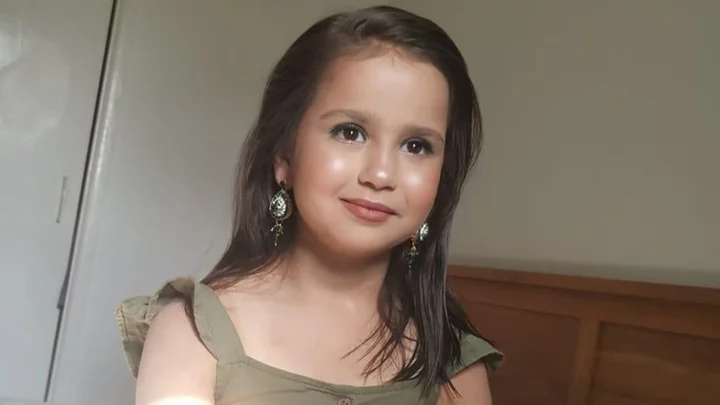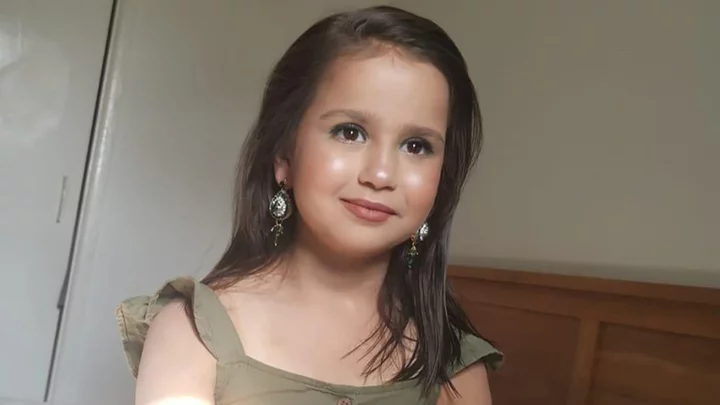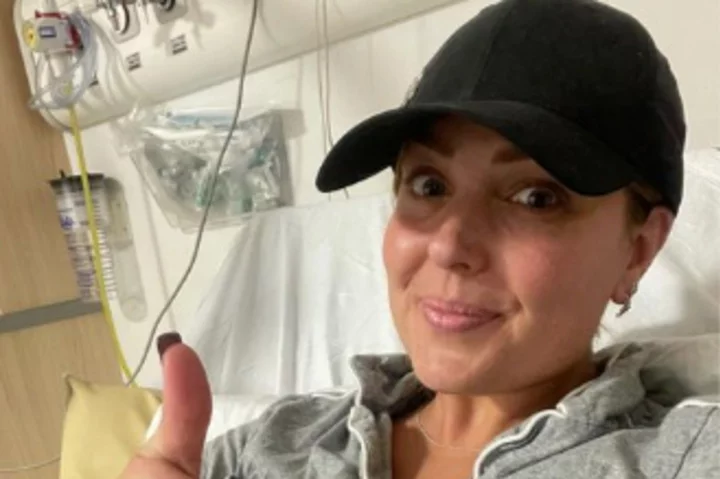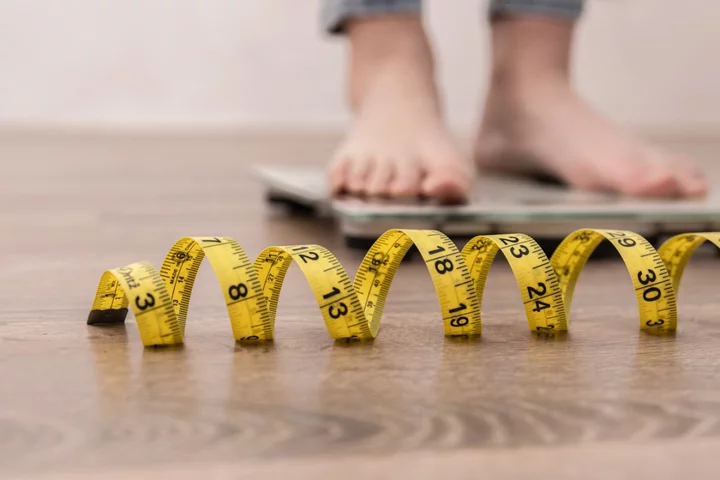
Alabama QB competition set to last into marquee Texas matchup in Week 2
Nick Saban isn't giving anything away in the Alabama quarterback competition, even indicating that the starter in Week 1 may not keep the job.
1970-01-01 08:00

Elle King opens up about her ‘deep depression’ during pregnancy and two-year postpartum journey
Elle King has spoken out about suffering with a “deep depression” during and after her pregnancy. The singer, 34, took to Instagram on Wednesday (23 August) to speak candidly about her mental health, two years after welcoming her son, Lucky, who she shares with tattoo artist Daniel Tooker. Her post included different videos of herself, in which she was working out, cleaning her skin, or singing on a stage. In the caption, she went on to reflect on her weight loss journey throughout the last two years, and acknowledged that she still plans to continue her workout routine. “I am making this post to share my journey from 284 lbs at 5‘3 from pregnancy 2021 - now 2023,” she wrote. “It doesn’t happen overnight. It didn’t even happen in a year for me. In fact, it’s an ongoing still working towards ever changing goals kinda thing.” King continued her post by opening up about her mental health struggles - both during and after her pregnancy - which included postpartum depression. “I fell into a very deep depression during my pregnancy. I also didn’t even realise how intense postpartum depression is and was until I very slowly began to crawl out,” she wrote. “I felt trapped in my body.” While symptoms of postpartum depression can vary, some of them can include difficulty bonding with your baby, withdrawing from loved ones, and a loss of appetite, according to the Mayo Clinic. In her Instagram caption, King went on to explain that amid her symptoms of postpartum depression, she started working out more. She then acknowledged that she’s now seen her body get “stronger” over time. “Metabolic workouts. Light cardio to warm up my body, my lungs, my voice, and my spirit. I am a creature of habit, so I changed my f***ing habits,” she wrote. “Every few weeks I feel my body getting stronger. I add more workouts.” The “Ex’s & Oh’s” singer expressed that while she wanted to lose weight after welcoming her baby, there was “so much more” insentive since her brain “functions better on the days” that she moves her body. She also described how she’s now embraced the way that her body looks. “Some days I count stretch marks. Some days I hug myself and say thank you to my body. Today is a kind day. I’ve been tiny, I’ve been huge, BUT RIGHT NOW I’M HEALTHY,” she continued. “I can’t believe that I even have to say this, but no, I am not on any weight loss medication.” She added that she’s had a few health conditions over the years, including being pre-diabetic and suffering with Polycystic ovary syndrome (PCOS). PCOS is a condition that consists of “problems with hormones that happens during the reproductive years,” as noted by the Mayo Clinic. Symptoms can range from irregular periods to polycystic ovaries, which are “follicles containing immature eggs may develop around the edge of the ovary”. King continued her message by sharing that her “diabetic grandfather died” when she was 10-years-old, after she “watched him prick his finger and give himself shots”. She concluded by showing her support for her followers, and by sharing the goal of her workout routine, writing: “I do not judge anyone who is trying to live a healthier life. I can only share MY OWN JOURNEY! I just hope to live a long, wonderful, healthy life where I can drink a lot, eat fish, laugh as much as I can, and die happy.” This isn’t the first time that King has been open about some of the health challenges she has faced. When announcing her pregnancy in 2021, during an interview with People, she revealed that she’s had struggles with infertility, explaining that she previously suffered two pregnancy losses due to her PCOS. “It’s such a major thing that so many people go through, but it’s so secretive - like you have to go through it alone,” she said about the pregnancy loss. “Nobody talks about it. It’s like you’re supposed to feel shame; like you’re not supposed to tell people before 12 weeks, because if you lose it, it’s going to be embarrassing for you and you don’t want other people to get their hopes up. Like, holy s***.” Read More New mother filmed doing laundry seven days after giving birth sparks debate ‘It can hit everyone’: Postnatal depression is surging, and it’s still misunderstood Olivia Munn opens up about her postpartum body 20 months after giving birth Sienna Miller pregnant with her second child Serena Williams celebrates second pregnancy with ‘pre-push party’ Lisa Snowdon opens up about ‘tortured thoughts’ after abortion: ‘Was that my chance?’
1970-01-01 08:00

BBC Radio 2’s Tony Blackburn reveals he had sepsis and pneumonia in health update
Tony Blackburn has revealed that he had life threatening sepsis and pneumonia after coming out of a two-month stay in hospital. The veteran BBC Radio DJ had pulled out of his Sound Of the 60s UK Tour and accompanying radio show earlier this year after he was taken ill. At the time, Blackburn told his listeners he had a chest infection. Now that Blackburn has fully recovered and has been discharged from hospital, the DJ has revealed that he was actually suffering from sepsis, pneumonia and blood poisoning. “I was doing three a week at one time forgetting that I’m now a little bit older, so I ended up in hospital for two months with sepsis and pneumonia and blood poisoning,” he said on BBC Radio Scotland’s Afternoon Show on Wednesday (23 August). “And I didn’t realise how unwell I was until one day in the hospital my whole family were gathered around the bed. And I thought ‘this isn’t good’.” “A couple of weeks ago I went to see my specialist and he said ‘you are cured’, so that was a nice thing to hear.” After a three-month break, Blackburn has returned to his tour but will be doing one show per week rather than three per week. He said: “I haven’t been doing the [tour] show for about three months because I was told to rest a little bit. Now I’m back in form and we’re selling out.” “I love being with the band and it’s just loads of fun.” Blackburn returned to BBC Radio 2 after Johnnie Walker covered his Sounds of the 60s radio show during his illness and has since launched a new show on Sunday afternoons – Tony Blackburn’s Soul on Sunday on BBC Radio London. Back in May, Blackburn announced that he had been discharged from hospital and was looking forward to broadcasting again. “After three weeks in hospital I have just been discharged and am now at home to have some more treatment by having a daily injection for a few days from a hospital near me,” he said. “Thanks to everyone at the Wellington Hospital in London, doctors and nurses for looking after me. “After my treatment and a rest I look forward to getting back @BBCRadio2 and @BBCLOCALRADIO to doing what I love doing. Just want to thank all my friends for your lovely messages, you are all so kind to think about me xx,” he concluded. According to the NHS, sepsis is a life-threatening reaction to an infection when your immune system overreacts to an infection and starts to damage your body’s own tissues and organs. There are lots of symptoms of sepsis, and those symptoms can be similar to other conditions, including the flu or a chest infection. Read More Former royal chef explains why Prince William and Kate’s children don’t eat with them What we know about the leaked Pentagon documents on Ukraine Bride tries on mother’s wedding dress 30 years after parents’ wedding 4 hacks to get teens off the sofa and get active – as study warns of heart damage Selling Sunset’s Amanza Smith says she ‘almost died’ from spine infection Strictly’s Amy Dowden finding it ‘so hard’ as she shares hair loss update amid cancer
1970-01-01 08:00

Sara Sharif: Court rules girl's Pakistan family cannot be detained
A court in Pakistan says police must not detain relatives of Sara Sharif's father for questioning.
1970-01-01 08:00

Selling Sunset’s Amanza Smith says she ‘almost died’ after suffering from spine infection
Selling Sunset star Amanza Smith has shared an update after undergoing surgery to treat an infection that spread from her bloodstream to her spine. The interior designer, who works at the real estate company The Oppenheim Group, has revealed in a new interview how osteomyelitis, a painful bone infection, had affected her lower vertebrae. Smith, 46, discovered the infection after experiencing severe backache that lasted nearly a month. After she collapsed while at her Los Angeles home back in May, her friend encouraged her to visit the hospital. “I thought I had a backache, and I almost died,” Smith told People in the magazine’s latest issue. “The doctors and my friend saved my life.” Smith told the publication that she was given antibiotics to treat the infection but faced some complications. She underwent surgery on her lower spin to “clear the infection from the bones” but later found out that the osteomyelitis had affected another area at the front of her spine. “The risk was the antibiotics wouldn’t penetrate the bone, and my entire back could collapse,” she said. Smith had two surgeries to treat the osteomyelitis, which included having part of her spine replaced after it “deteriorated” as a result of the infection. The second operation lasted six hours, in which doctors inserted a titanium mesh cage in her back. She previously said: “Part of my spine has completely deteriorated due to the infection and I’ll be getting a new vertebrae and a couple of screws and rods in my spine to replace what has been eaten away from the bacteria.” In the new interview, she told People: “I am an iron woman, with rods and screws.” Smith returned home from hospital in early July, but her recovery period involves six months of antibiotics, physical therapy and “treading lightly on her feet”. “There are so many things I can’t do, because I can’t lift more than five pounds,” she told the publication. “Sometimes my purse is too heavy. You can’t speed up time, but I’m very anxious to be able to do the things that I love to do. I like to decorate. I like to rearrange. I want to be able to hang things, but I’m very limited right now.” Reflecting on her period in hospital, Smith said that she would never take her mobility “for granted” again. “When I can walk and jog again and do Pilates or ballet, I hope I stick to them because I plan on living to be 107,” she said. According to the NHS, osteomyelitis is a painful bone infection that usually goes away if treated early with antibiotics. However, it can cause serious long-term problems if not treated. Anyone can develop the infection, but a person may be more at risk if they have diabetes, a broken bone, a weakened immune system or recently had an infection or surgery. Smith joined Netflix’s hit reality show Selling Sunset in the second series in 2019. The show follows the drama surrounding employees at The Oppenheim Group, an elite real estate brokerage selling luxury properties in Los Angeles. Read More Queen’s service to inspire young writers in Commonwealth challenge High infidelity: why do people have affairs? Bride tries on mother’s wedding dress 30 years after parents’ wedding Revlon hits back at Selling Sunset star after she found makeup in her husband’s van Strictly’s Amy Dowden finding it ‘so hard’ as she shares hair loss update amid cancer How to help your teen with comparison culture on GCSE results day
1970-01-01 08:00

Sara Sharif murder inquiry: Renewed appeal two weeks after girl found dead
Police are continuing to investigate after the 10-year-old's body was found at her home in Woking.
1970-01-01 08:00

Vogue at centre of gender row for naming trans cyclist Emily Bridges as only sportswoman in its list of top 25 ‘powerhouse’ women
Critics are hitting out over Vogue magazine’s decision to name transgender cyclist Emily Bridges as the only sportswoman in its list of the world’s top 25 “powerhouse” women
1970-01-01 08:00

Strictly’s Amy Dowden finding it ‘so hard’ as she shares hair loss update during cancer treatment
Amy Dowden has shared an update on her hair loss after announcing she has breast cancer. The professional dancer, who is best known for appearing on BBC’s Strictly Come Dancing since 2017, revealed earlier this year that she had been diagnosed with stage three breast cancer. The dancer told fans that she underwent a single mastectomy after she was first diagnosed in May. Last month, however, she was told by doctors that she needed to undergo chemotherapy after further tumours were discovered following the surgery. Dowden, 33, has been keeping her fans updated as she navigates the treatment. In her latest update, shared on Wednesday (23 August), the dancer revealed she has been experiencing hair loss and was finding it “so hard”. Telling fans she had returned home after receiving treatment in the hospital, Dowden shared a picture as she held a clump of her hair, writing: “Welcome home,” with a series of broken heart emojis. She added: “So much everyday! So hard! One day at a time!” In a previous post, Dowden shared a video of her hair that had fallen out, writing: “The reality when I gentle comb,” with a broken heart emoji. Dowden told fans in a separate post that she had some blood clots but was “feeling good” following the treatment. “And I’m going home to my own bed,” she told fans. “Thanks again to the marvellous NHS! Got some blood clots but I’m feeling good other than a sore and swollen arm. Another hurdle along this journey. But again forever grateful to the nhs and my heroes around me.” Earlier this month, Dowden showed her followers the bespoke wig she had made to deal with her ongoing hair loss. Both Dowden and the owner of Be Unique Wigs by Charlotte shared a screenshot of their messages to Instagram, as Dowden thanked her for making the wig. Charlotte, the wigmaker, wrote: “I’ve been working on a wig for the beautiful @amy_dowden and just received this lovely message from her! “I love her,” wrote Dowden in the messages, asking if she could order another one. “Thank you so so so very much.” The wigmaker said in an Instagram post that it was an “honour” to make the wig for the Strictly professional. “I’m hoping it will give you some comfort in a difficult time, I’ve said many times on here... it’s not just hair!” she said. “Losing your hair can make such a difference to your confidence. It’s almost like losing part of your identity,” Charlotte added. After announcing her diagnosis earlier this year, Dowden told fans that she would not be able to dance in a competitive capacity on this year’s season of Strictly. “This year, it means I’m not going to be able to dance with a celebrity on Strictly, but I’m in such regular contact with the team – the BBC have just been utterly incredible,” she wrote in a post on social media last month. “The rest of the year looked very different to what was planned but hopefully I’ll enter 2024 cancer free and I’ll never take anything for granted and promise to live life to the full.” Dowden joined Strictly in 2017, and has competed in every series since, reaching the final in 2019 with kids’ TV presenter Karim Zeroual. Read More Former royal chef explains why Prince William and Kate’s children don’t eat with them Barbie drooling over Darcy? Why we still ardently love the BBC’s 1995 Pride & Prejudice Prince Harry to return to UK on eve of Queen’s death anniversary for charity event Amy Dowden shares pictures of new wig amid chemotherapy treatment for breast cancer How to help your teen with comparison culture on GCSE results day Women more severely affected by ME, study claims
1970-01-01 08:00

How to help your teen with comparison culture on GCSE results day
Whether your child’s GCSE results are high, low, or somewhere in between, one thing is inevitable – they’ll compare them with their friends’ grades. This comparison culture, which is far more pervasive because of social media, can leave teens feeling inadequate because their results are worse than their mates, or make their friends feel useless if roles are reversed. But although there’s no getting away from teenagers comparing their results both on and offline, what can parents do to try and limit the damage this it can cause? Former teacher Dr Julia Clements, principal educational psychologist at the children’s mental health charity Place2Be, says the comparison of results will undoubtedly impact some teenagers’ wellbeing. “Your teenager is bound to compare their results with their peers at the same school, but also through social media,” she acknowledges. “Although this comparison is inevitable, it may be harmful for your child’s wellbeing – especially if they’ve not done as well as expected. “Indeed, the term ‘compare and despair’ can be especially pertinent on days like today.” Sharon Davies, CEO of Young Enterprise, a charity which helps young people navigate the changing world of work, adds: “The pressure to measure up to their friends’ achievements can be overwhelming, leading to feelings of inadequacy or disappointment.” So how can parents help their teens? 1. Ask how they feel If your child is down on themselves and rating themselves negatively in comparison to their friends, they may reject any positives and praise parents provide, Clements warns. “It may be more useful, in the first instance, to ask them how they’re feeling, and to acknowledge and validate difficult feelings,” she advises. Such feelings may include disappointment, sadness, anger, shame, or feeling as if they’ve let themselves – and you – down. “If your child is feeling like this, it’s important to give them the message that you love them unconditionally and you’re proud and pleased to be their parent because of who they are – not because of the grades they achieve,” she stresses. 2. If they’ve done better than their friends… If your child has achieved good results, which may be better than some of their friends, then they’ll want to celebrate. But while celebrating is of course a great idea, Clements suggests: “You may want to talk with them about how to be sensitive and compassionate towards their friends who haven’t done so well.” 3. Help them turn a negative into a positive Consultant clinical psychologist Dr Nihara Krause specialises in teenage mental health and is working with the Talking Futures campaign to help parents engage their children in meaningful conversations about their futures. She says if a young person doesn’t get the grades they were hoping for, they may be highly critical of their performance in comparison to their peers. But she suggests parents show them how to turn their negative thinking around. “Parents should encourage their children to focus on recognising the approach they took to exams this time round and take steps to reflect on what they could do to achieve a better result in the future. Focus on what helps a young person gain their own personal best, no matter how their results compare with others.” 4. Don’t ask about their friend’s results or post about them Krause says parents should try to celebrate their child’s achievements for what they are and avoid asking about their friends’ results. “To avoid comparison, parents should also avoid sharing their child’s results on social media,” she says. 5. Don’t be too hard on yourself Clements points out that comparison culture may not just affect teenagers – if their results aren’t as good as expected, mums and dads might start comparing their own parenting during the revision and exam period with other parents whose kids have got better results. “As a parent or carer, you may also be drawn into unhelpful comparisons with others,” says Clements, “and you may question the amount of support you were able to provide your child in the run up to their exams. However, today is not a day for self-criticism or judgements – some self-compassion is important at this time.” 6. Reach out for support This might be the first results day many parents have gone through with their child, and while comparisons with other teens may well have been unhelpful, Davies points out that schools will have career advisers and teachers available who can offer support and advice. There are also online forums and blogs where those in similar situations share their experiences. She says: “No-one is expecting you to have all the answers – that’s why there’s support available.” Read More Charity boss speaks out over ‘traumatic’ encounter with royal aide Ukraine war’s heaviest fight rages in east - follow live Women more severely affected by ME, study claims 4 hacks to get teens off the sofa and get active – as study warns of heart damage Taking adult education classes may lower risk of dementia, study suggests
1970-01-01 08:00

Women more severely affected by ME, study claims
Women with myalgic encephalomyelitis/chronic fatigue syndrome (ME/CFS) tend to have more symptoms and co-occurring conditions than men, according to the world’s largest study of the disease. The study, entitled DecodeME, reveals women who have the condition for more than 10 years are more likely to experience increasingly severe symptoms as they get older. ME/CFS is estimated to affect more than 250,000 people in the UK, of all ages and from all social and economic backgrounds. Its key feature, called post-exertional malaise, is a delayed dramatic worsening of symptoms following minor physical effort. Other symptoms include pain, brain fog and extreme energy limitation that does not improve with rest. Causes are unknown and there is currently no diagnostic test or cure. Experts from the University of Edinburgh analysed anonymous survey questionnaires from more than 17,000 people with ME/CFS. Two-thirds of women, and slightly more than half of men, reported at least one active co-occurring condition. Similarly, 39.2% of women and 28.6% of men reported at least one inactive co-occurring condition. We discovered that the disease is worse for women, in older people, and many years after their ME/CFS started Professor Chris Ponting of the University of Edinburgh A condition was considered active if the participant had experienced symptoms in the preceding six months. The most common active co-occurring condition was irritable bowel syndrome, with clinical depression, fibromyalgia, anaemia and hypothyroidism also featuring prominently. Women also reported, on average, more symptoms than men – 42 compared with 36. The most common of these symptoms were brain fog – a term commonly used to describe the cognitive impairment experienced by participants – unrefreshing sleep and muscle pain. These findings highlight the very serious impact ME/CFS has on women who are disproportionately affected Sonya Chowdhury, chief executive of Action for M.E Participants were also asked to define the severity of their illness from mild to very severe using definitions from the UK’s National Institute for Health and Care Excellence guidelines. Experts identified that being a woman and having ME/CFS for more than 10 years are risk factors for severe illness, with symptoms increasing in intensity as they age. Professor Chris Ponting, study lead from the MRC human genetics unit at the University of Edinburgh’s Institute of Genetics and Cancer, said: “ME/CFS is a devastating disease affecting a UK population the size of Derby. “We discovered that the disease is worse for women, in older people, and many years after their ME/CFS started. “Our hope is that DecodeME’s genetic results will shed light on why certain groups are more susceptible to ME/CFS than others.” Sonya Chowdhury, chief executive of Action for M.E. and chair of the management group of the study, said: “These findings highlight the very serious impact ME/CFS has on women who are disproportionately affected. “It’s important to also recognise the impact that it has on men who have ME/CFS and we thank the 20,000 men and women who have already signed up to take part in this very important study. “We still need more to join us, so if you are 16 or older, live in the UK and have a diagnosis of ME/CFS, please do take part now to help us decode ME at www.decodeme.org.uk/portal.” Read More Charity boss speaks out over ‘traumatic’ encounter with royal aide Ukraine war’s heaviest fight rages in east - follow live 4 hacks to get teens off the sofa and get active – as study warns of heart damage Taking adult education classes may lower risk of dementia, study suggests Indiyah Polack: I didn’t want to go on Love Island because of my acne
1970-01-01 08:00

Fox News Is Bringing Drones to the First GOP Presidential Debate
The first Republican Presidential Debate is tonight in Milwaukee. Donald Trump will famously not be there, choosing instead to tape a pre-recorded interview wit
1970-01-01 08:00

Weight loss surgery can reduce risk of cancer among women, study says
Weight loss surgery can help lower the risk of developing cancer, a study has claimed. The study, conducted by researchers at the University of Utah, also found that cancer mortality rates were significantly lower among female surgical patients compared to those who did not receive any bariatric surgery. Although population studies have previously established a positive association between body mass index and cancer rates, it has remained unclear whether the reduction in body weight leads to reduced cancer risk. Researchers say this is due to significant and sustained weight loss in large populations which may be difficult to achieve. However, because of the substantial and maintained weight loss following bariatric surgery, recent studies have reported reduced cancer rates and lower cancer mortality compared with those who haven’t had the proceedure, according to the study’s authors. “As scientists study human diseases, an element of discovery is to confirm like results from multiple studies,” said study author Ted Adams. “This research represents another important study that strongly supports the long-term benefits of weight loss surgery in the prevention of cancer.” Researchers compared cancer prevalence and death rates arranged according to obesity and non-obesity-related cancers, looking at sex, stage of the disease and procedure. The study looked at 22,000 bariatric surgery patients compared with non-surgical subjects with severe obesity between 1982 to 2019. Each patient was matched up based on age, sex, and body mass index. Scientists found that the bariatric surgery group had a 25 per cent lower risk of developing any cancers compared to the non-surgery group. Female patients had a 41 per cent lower risk for developing obesity-related cancers compared to those who did not have surgery done. Cancer risk for male bariatric surgery patients was not lower compared to non-surgery male subjects. Overall, a significant reduction in cancer risk was shown for cancers such as uterine, ovarian, colon, pre-menopausal breast and post-menopausal breast. The study also revealed death from cancer was lower by 47 per cent among female bariatric surgery patients in comparison to matched non-surgery female patients. “Important findings of this study are that bariatric surgery results in lower incidence rates of colon cancer (prior studies have not been consistent),” Dr Adam said. “Also, both pre and post-menopausal women experience reduced breast cancer incidence following bariatric surgery, which may suggest weight loss among women in either category with severe obesity may benefit from reduced breast cancer.” The study is available online in the journal Obesity. Read More Can a vegan diet help with hot flashes in menopausal women? Exercise apps could help boost healthcare workers mental health How to check if you have skin cancer: Symptoms and signs to look out for
1970-01-01 08:00
